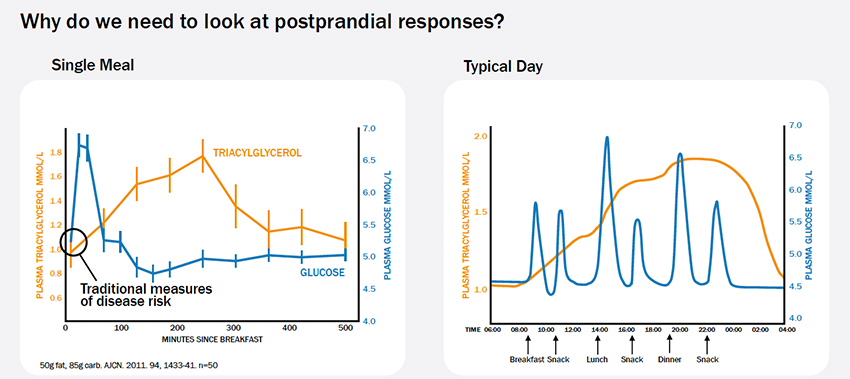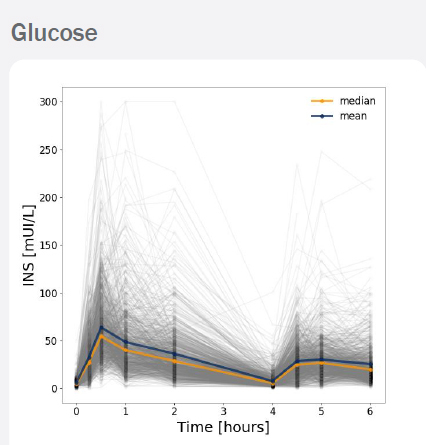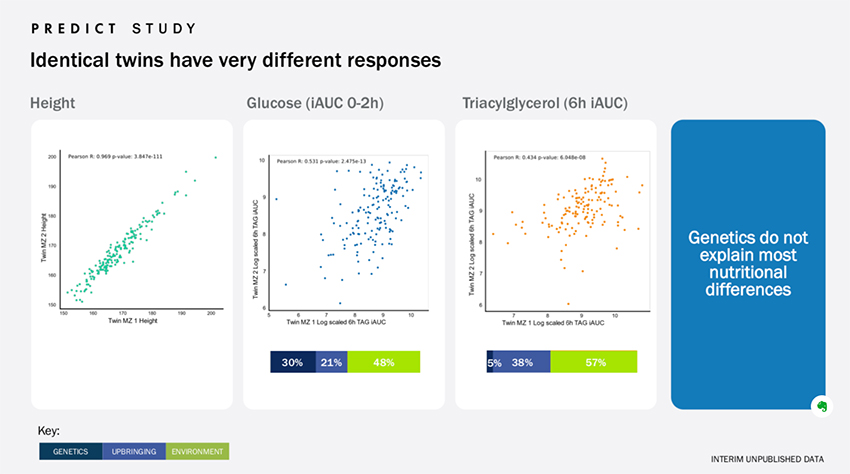The quote is from GenoPalate, one of several websites using nutrigenomics to craft an individual diet plan for you or me. Like other companies, they are pushing genetic testing that can identify variants that may impact your nutritional intake. There is a significant amount of science, to be fair, suggesting that our genes affect our need for and absorption of various nutrients. The real question not being asked or answered is how powerful is that effect? A presentation at a conference sponsored by the American Society for Nutrition in 2019 can provide some answers.
The research consisted of having 1000 individuals eat a specific meal and evaluating their metabolic response with a series of blood tests over several hours. The test collected the usual demographic information and included both identical and non-identical twins, thereby helping to tease out the impact of genetics. Participants ate the same meal every morning and were on their own for the rest of the day. The nutritional intake was captured in real-time. They contributed fecal material to evaluate their microbiome and underwent continuous glucose monitoring after one of those managed breakfasts, an isocaloric muffin.
Over the course of the study, the participants ate 32,000 of the muffins along with 132,000 meals, had 2 million+ glucose measurements, and blood drawn 28,000 times. Participants averaged 45, with a BMI of 26 (“normal”), and 72% female. More importantly, there were 479 monozygotic (identical) twins, 172 dizygotic (non-identical twins), and 351 unrelated participants.
Their goal was to develop a machine-learning algorithm, and long story short, they failed to succeed. Only about a third of the variation in metabolic response was due to diet alone. As they wrote,
“The large and modifiable variation in metabolic responses to identical meals in healthy people explains why ‘one size fits all’ nutritional guidelines are problematic. The genetic component to these responses is moderate, leaving the majority of the variation potentially modifiable.”
We can break down this conclusion by looking at some of the graphs from the presentation.

For those who have not been following this developing science, we need to understand that our traditional measures of metabolism, glucose, and cholesterol levels are merely screen-grabs in the metabolism movie of our day. We have more refined glucose metabolism tests, such as two-hour, post-prandial glucose tests, but none for lipids, at least in standard clinical practice. From the pictures, you can see how one moment fails to tell the entire metabolic story.
 As you would expect, there was quite a bit of individual variation in our response to that magic muffin. The graph of the response to glucose is to the left, but similar charts were produced for insulin and triglycerides. Again, as might be anticipated, there was far less variability between meals for any individual than between individuals. We all seem to have individually consistent patterns of metabolism.
As you would expect, there was quite a bit of individual variation in our response to that magic muffin. The graph of the response to glucose is to the left, but similar charts were produced for insulin and triglycerides. Again, as might be anticipated, there was far less variability between meals for any individual than between individuals. We all seem to have individually consistent patterns of metabolism.
Those identical, monozygotic twins share the same genetics, and in no small degree, share very similar, but not necessarily identical environments. If genetics plays a large role in our metabolism, identical twins would be pretty close to metabolically identical. It turns out this is an unwarranted conclusion. Here is the graphic.

You can see from the first figure that when it comes to height, identical twins are pretty similar; they all fall along that one line. But look at glucose and triglyceride metabolism; they are literally all over the block. The caption is the conclusion.
The individual macronutrients we take in only account for 16-32% of our metabolic response. So much for the value of food labels. The complexity of the foods, how fast they release nutrients, how they are prepared all contribute to our metabolism. As does our lifestyle, e.g., exercise, sleep, stress, when we eat, our microbiome, and yes, genetics. The impact of our genes was similar to that of our choice of macronutrients. The good news is that our fate is not indelibly created at the moment of our conception; it has far more to do with our lifestyle – an area we can modify, although that is often easier said than done.
These companies offering genetic testing to aid in your nutritional needs are not selling snake oil; they are just not as straightforward as to the impact of this information as they might be. They will help you feel more in control of your health. After all, you are doing the “requisite testing.” And they may make it easier to choose what and what not to eat, although they have no evidence that a genetic diet, like a blood-type diet, works any better than a sensible diet that's predominantly plant-based and diverse.
Bottom line: For some individuals, this type of testing is the necessary commitment to changing their habits. It can provide them with some personalized guidance that might be more difficult to find locally. It is not a magic bullet, and the science is far from complete.




